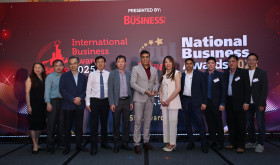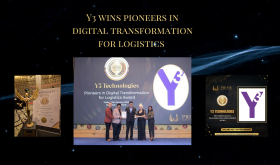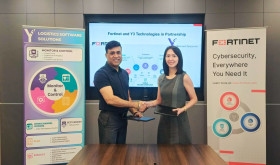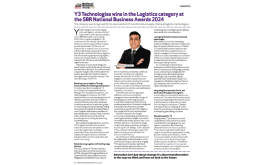
Y3 Technologies looks for new growth by expanding overseas and investing in new capabilities
Singapore, 2 January, 2017 – SINGAPORE-BASED logistics technology solutions provider Y3 Technologies took quite a few gambles in December 2015, starting with a decision by its current Chief Executive Officer, Marc Dragon, 44, to uproot himself and his family from here and relocate to Shanghai.
[vc_empty_space height=”24″ image_repeat=”no-repeat”][vc_column_text]
He then made frequent trip to Chongqing in Western China to start cultivating connections and to get to know the logistics sector there better – incurring expenses that many small and medium-size enterprises (SMEs) might have deemed extravagant given the weak economy.
[/vc_column_text][vc_empty_space height=”24″ image_repeat=”no-repeat”][vc_column_text]
“In order to really understand a country and a market, you need to be immersed in it,” said Mr. Dragon.
[/vc_column_text][vc_empty_space height=”24″ image_repeat=”no-repeat”][vc_column_text]
“We spent almost a week every month visiting Chongqing for 10 to 12 months to seed these ideas that we had,” he added in a phone interview from Shanghai with the Business Times last week. “It’s important to be very clear about how you’re going to expand and survive. And for us, it’s about rethinking technology and markets.” Mr. Dragon had joined Y3 Technologies only a little over a year ago after previously holding leadership roles at IBM, Deloitte Consulting and Antuit, an analytics services firm.
[/vc_column_text][vc_empty_space height=”24″ image_repeat=”no-repeat”][vc_column_text]
At a time when Singapore’s growth is slowing, Y3 Technologies’ ventures into external markets and new capabilities in analytics might seem a bit too bold for an SME to take.
[/vc_column_text][vc_empty_space height=”24″ image_repeat=”no-repeat”][vc_column_text]
However, Mr. Dragon said that these steps, taken over the course of 2016, are to serve as fuel for more growth for the company – which currently had about 200 staff in Singapore, China and India.
[/vc_column_text][vc_empty_space height=”24″ image_repeat=”no-repeat”][vc_column_text]”We have a very clear mid-term destination: it’s for Y3 Technologies to target an IPO (initial public offering) by 2020,” he said.[/vc_column_text][vc_empty_space height=”24″ image_repeat=”no-repeat”][vc_column_text]There are some indications that this year-long gambit has paid off as the network cultivated is slowly producing concrete business opportunities.[/vc_column_text][vc_empty_space height=”24″ image_repeat=”no-repeat”][vc_column_text]For example, Y3 Technologies sealed an agreement with leading logistics operator Chongqing Transportation Group a fortnight ago to set up a joint venture that aims to transform Western China’s logistics sector.[/vc_column_text][vc_empty_space height=”24″ image_repeat=”no-repeat”][vc_column_text]In November last year, it inked a memorandum of understanding with Chongqing University of China (CQU) and Singapore Management University (SMU) to establish a laboratory to research and developed applications for the logistics industry as well as to drive innovation.[/vc_column_text][vc_empty_space height=”24″ image_repeat=”no-repeat”][vc_column_text]These initiatives fall under the auspices of the Chongqing Connectivity Initiative, a third government-level collaboration between Singapore and China, so it’s heartening to note that government officials are also taking notice of Y3 Technologies’ efforts.[/vc_column_text][vc_empty_space height=”24″ image_repeat=”no-repeat”][vc_column_text]The company’s venture into Chongqing was in turn propelled by recent strategic investments that it had made.[/vc_column_text][vc_empty_space height=”24″ image_repeat=”no-repeat”][vc_column_text]Sensing the potential of the e-commerce market, it acquired business intelligence solutions provider Ascentis in June 2016. Ascentis develops and builds customer relationship management and e-commerce platforms that can be integrated with point-of-sale systems. This allows it clients, which include Changi Airport Group, Muji and Crystal Jade, to react in real-time to market demands.[/vc_column_text][vc_empty_space height=”24″ image_repeat=”no-repeat”][vc_column_text]The acquisition enabled Y3 Technologies to enter into a new segment in the supply chain sector. “We became a B2B2C company,” said Mr. Dragon, using an acronym that refers to the merging of business-to-business and business-to-consumer models. “We became a company that extended up and down the whole supply chain, from the logistics to the transport to the consumers.”[/vc_column_text][vc_empty_space height=”24″ image_repeat=”no-repeat”][vc_column_text]Y3 Technologies’ new growth trajectory was also set in motion by its new focus on analytics. Mr. Dragon said that when came on board in 2015, the company had zero staff in this area; by 2016 it had a team of 10.[/vc_column_text][vc_empty_space height=”24″ image_repeat=”no-repeat”][vc_column_text]New market realities beget such a move, said Mr. Dragon. “The market is moving at such a speed that you cannot afford to use a traditional mindset and capabilities to address new problems” such as the increased challenging in achieving multi-objective optimisation (MOO).[/vc_column_text][vc_empty_space height=”24″ image_repeat=”no-repeat”][vc_column_text](MOO, in industry speak, is concerned with how equipment should be distributed to maximise effectiveness while minimising load. In everyday parlance, for example, it’s about how one gets goods shipped across distances, jurisdictions even, at the lowest cost and shortest possible time.)[/vc_column_text][vc_empty_space height=”24″ image_repeat=”no-repeat”][vc_column_text]Mr. Dragon said his firm will continue to try to deepen its expertise in analytics through collaborations. Its November MoU is one such example.[/vc_column_text][vc_empty_space height=”24″ image_repeat=”no-repeat”][vc_column_text]”I like to apply the perspective of partnering and leveraging off each others’ strengths. You don’t necessarily need to have these data scientists under your headcount. If you look at SMU, CQU, we’re moving along the same lines. We can achieve the same goals together.”[/vc_column_text][vc_empty_space height=”24″ image_repeat=”no-repeat”][vc_column_text]Mr. Dragon said he was not at liberty to divulge details, but in Chongqing, Y3 Technologies is looking to set up “multimodal platforms”.[/vc_column_text][vc_empty_space height=”24″ image_repeat=”no-repeat”][vc_column_text]In Shanghai – a de facto “second headquarters”, he says – Y3 Technologies intends to “build higher capabilities and analytics engagement management”. Engagement management refers to the handling of the contractual relationship between client and vendor so that a project’s profitability will not be compromised.[/vc_column_text][vc_empty_space height=”24″ image_repeat=”no-repeat”][vc_column_text]Other markets in China like Wuhan, and further afield in Indonesia and Thailand, are also on Y3 Technologies’ radar for 2017, said Mr. Dragon.[/vc_column_text][vc_empty_space height=”24″ image_repeat=”no-repeat”][vc_column_text]The opportunities that these overseas markets offer are immense, particularly for a Singapore-based company in the logistics sector, he says.[/vc_column_text][vc_empty_space height=”24″ image_repeat=”no-repeat”][vc_column_text]”Scale,” he says bluntly. “Take, for example, a traditional problem like how do you move optimally. In Singapore, the number of points such as stores, warehouses, the most you can look at is typically about 100 points. In Chongqing? They’re in the tens of thousands.”[/vc_column_text][vc_empty_space height=”24″ image_repeat=”no-repeat”][vc_column_text]This means that the operational problems encountered in these markets are so much more complex, he said. This will in turn deepen the skills of its employees and the company. The company will then, as a result, by ready to take on whatever problems that may come.[/vc_column_text][vc_empty_space height=”24″ image_repeat=”no-repeat”][vc_column_text]Mr. Dragon was hesitant to reveal exact figures, but said that between 2015 and 2016, the firm’s revenue more than doubled. Most of this came from ASEAN and Singapore operations.[/vc_column_text][vc_empty_space height=”24″ image_repeat=”no-repeat”][vc_column_text]”Going in 2017, we’re planning on high double-digit growth,” he said. “And China will be a big revenue contributor.”[/vc_column_text][vc_empty_space height=”24″ image_repeat=”no-repeat”][vc_column_text]And should things go its way, the company should be able to present a convincing case for investors to help achieve a public listing in 2020, said Mr. Dragon, one which will probably be a dual listing.[/vc_column_text][vc_empty_space height=”24″ image_repeat=”no-repeat”][vc_column_text]One of these is expected to be in Singapore, while Mr. Dragon was coy about divulging the second, preferring only to emphasise that his company has a clear mid-point destination. “The intent needs to be clear. Then we can execute,” he said.[/vc_column_text][vc_empty_space height=”24″ image_repeat=”no-repeat”][vc_column_text]For the feature in The Business Times, please visit: http://www.businesstimes.com.sg/transport/y3-technologies-chongqing-transportation-set-up-joint-venture [/vc_column_text][vc_empty_space height=”34″ image_repeat=”no-repeat”][vc_row row_type=”row” use_row_as_full_screen_section=”no” type=”full_width” text_align=”left” box_shadow_on_row=”no”][vc_column][/vc_column][/vc_row]










